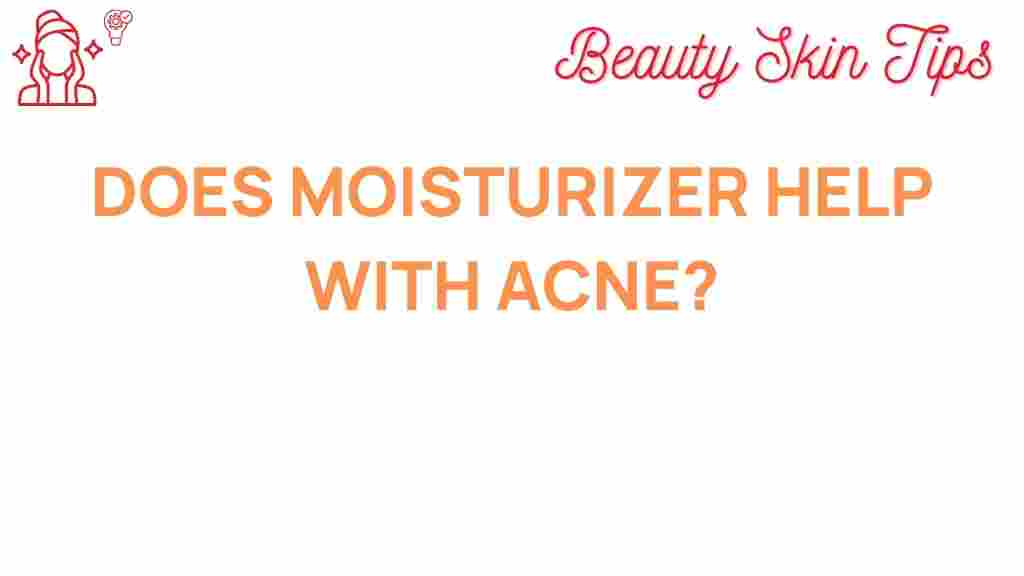The Surprising Truth: Does Moisturizer Really Help with Acne?
Acne is one of the most common skin conditions affecting millions of people worldwide, and it can be a source of frustration and low self-esteem. Many individuals struggling with acne often wonder whether they should use a moisturizer on their skin. This question leads to a myriad of opinions and advice, which can be confusing. In this article, we will uncover the surprising truth about moisturizers and their role in acne treatment, focusing on how they can help or hinder the healing process.
Understanding Acne and Its Causes
Before diving into the effects of moisturizers, it’s essential to understand what acne is and what causes it. Acne occurs when hair follicles become clogged with oil, dead skin cells, and bacteria. This can lead to various types of blemishes, including:
- Whiteheads
- Blackheads
- Pustules
- Nodules
- Cysts
Several factors contribute to acne, including:
- Hormones: Fluctuations during puberty, menstruation, or pregnancy can increase oil production.
- Diet: Certain foods, especially those high in sugar and dairy, have been linked to acne.
- Stress: Increased stress can lead to hormonal changes that exacerbate acne.
- Genetics: A family history of acne can increase your likelihood of developing the condition.
The Role of Moisturizer in Skincare
Moisturizers are designed to hydrate the skin, preventing dryness and maintaining a healthy skin barrier. When it comes to acne, the use of moisturizer can be controversial. Some believe that applying moisturizer will clog pores and worsen breakouts, while others argue that it is essential for overall skin health.
Why You Might Need a Moisturizer
Here are several reasons why using a moisturizer might be beneficial, even for acne-prone skin:
- Balance Oil Production: When the skin is overly dry, it may produce more oil to compensate, leading to clogged pores and more acne.
- Support Skin Barrier: A healthy skin barrier helps to protect against irritants and bacteria, which can worsen acne.
- Soothing Effects: Moisturizers can help soothe inflamed skin and reduce redness associated with acne.
- Hydration: Hydrated skin is less likely to experience irritation and flakiness, which can also contribute to breakouts.
Choosing the Right Moisturizer for Acne-Prone Skin
Not all moisturizers are created equal, especially when it comes to acne-prone skin. Here’s what to look for:
1. Non-Comedogenic Formulas
Choose moisturizers that are labeled as non-comedogenic, meaning they won’t clog pores.
2. Lightweight Textures
Consider gel-based or oil-free moisturizers that hydrate without feeling heavy on the skin.
3. Ingredients to Look For
Some beneficial ingredients include:
- Hyaluronic Acid: A powerful humectant that attracts moisture to the skin.
- Glycerin: Another excellent humectant that helps keep the skin hydrated.
- Aloe Vera: Known for its soothing and anti-inflammatory properties.
4. Ingredients to Avoid
Stay away from heavy oils, fragrances, and alcohols that can irritate the skin and contribute to breakouts.
Step-by-Step Process: Incorporating Moisturizer into Your Skincare Routine
Here’s a step-by-step guide on how to effectively incorporate moisturizer into your skincare routine to help manage acne:
- Cleanse: Start with a gentle cleanser to remove dirt, oil, and makeup without stripping your skin.
- Tone (Optional): If you use a toner, choose one that is alcohol-free and suitable for acne-prone skin.
- Treat: Apply acne treatment products (like salicylic acid or benzoyl peroxide) as directed.
- Moisturize: Once your treatment has absorbed, apply your chosen moisturizer to hydrate your skin.
- Sunscreen (Daytime): Always follow up with a broad-spectrum sunscreen during the day to protect your skin.
Troubleshooting: What to Do If Moisturizer Worsens Your Acne
If you notice that your acne worsens after using a moisturizer, consider the following troubleshooting tips:
- Evaluate the Product: Ensure the moisturizer is non-comedogenic and designed for acne-prone skin.
- Patch Test: Always conduct a patch test on a small area of skin before using a new product to check for adverse reactions.
- Review Your Routine: Sometimes, it’s not the moisturizer but other products in your skincare routine that may be causing breakouts.
- Consult a Dermatologist: If you’re still having trouble, seek advice from a skincare professional who can guide you in choosing the right products.
Conclusion
The surprising truth is that using a moisturizer can be beneficial for those with acne-prone skin, provided you choose the right product. A suitable moisturizer helps maintain skin hydration, balance oil production, and support the skin barrier, all of which can aid in reducing breakouts. Remember, the key is to select a lightweight, non-comedogenic formula that suits your skin type. For more information about skincare routines and products, check out this comprehensive guide.
Ultimately, everyone’s skin is different, and what works for one person may not work for another. Experiment with different products, and don’t hesitate to reach out to a dermatologist for personalized advice. By understanding the role of moisturizers in your acne treatment journey, you can take a step closer to clearer, healthier skin.
For additional resources on managing acne, consider visiting reputable websites like Acne.org for expert advice and community support.
This article is in the category Skincare and created by BeautySkinTips Team
